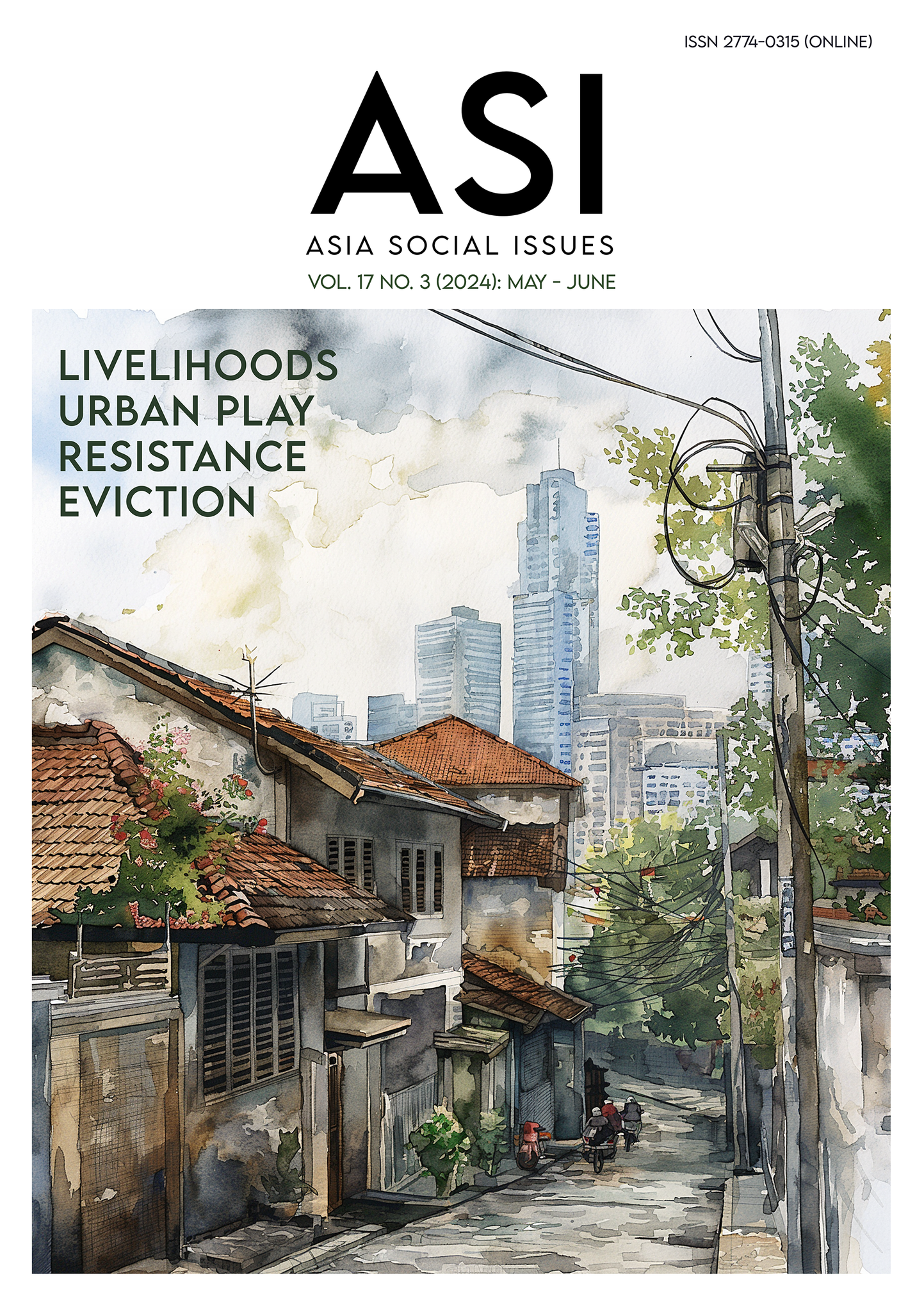Developmental Guidelines to be an Educational Innovative Organization for the Basic Schools in the Education Sandbox of Thailand
Main Article Content
Abstract
This quantitative research was conducted with the purposes of studying 1) the readiness of the innovation in School-Based Management (SBM); 2) the effectiveness of being an innovative organization in education; 3) to propose guidelines of being an educational innovative organization for pilot schools in the Education Sandbox. The sample group consisted of pilot schools in 6 regions of the Education Sandbox program, totaling in 208 participants from the population of 432 schools. The research results showed that the readiness in innovative SBM ranking upwards were 1) human resources; 2) academic; 3) general administration; and 4) budget managements. The effectiveness in being an educational innovation organization ranking upwards were 1) to increase the cooperation among all parties in improving education; 2) to decentralize power to the educational agencies and the schools; 3) to increase the learner’s achievement; and 4) to reduce the inequality in education. To develop the pilot schools into being an educational innovative organization, we needed to focus on aspects such as, Competency-Based Education (CBE), active learning, performance-based assessment for the learners, appropriate human resource management in planning and rewards systems, and to publicize the importance of the new way in education management to communities and all concerned.
Article Details

This work is licensed under a Creative Commons Attribution-NonCommercial-NoDerivatives 4.0 International License.
Copyright: CC BY-NC-ND 4.0
References
Alamooti, V., Ataei, M., & Moghaddas, Z. (2021). Explaining a model for the effects of high commitment human resource management. Journal of Management and Development Process, 34(1), 14.
Aree, S., Niemted, W., Choosuwan, R., & Chookemnerd, W. (2021). Sandbox: Principles and concepts for application in teaching and learning that focus on analytical thinking. Journal of MCU Nakhondham, 9(1), 166-181.
Arnove , R. F. & Torres, C. A. (2007). Comparative education: The dialectic of the global and the local. Marryland, the United States of America: Rowan & Littlefield.
Bowornwathana, P. (2009). Public organization theory. Bangkok, Thailand: Saksopa.
Dangphirom, S. (2019). Educational administration by using new innovations in the 21st century school (pp. 170-178). In Proceedings of the Conference on Graduate School Conference 2019. Bangkok, Thailand: Suan Sunandha Rajabhat University.
Earl, L., & Timperley, H. (2015). Evaluative thinking for successful educational innovation. OECD Education Working Papers Online. Retrieved from https://doi.org/10.1787/5jrxtk1jtdwf-en
Gropello, E. D. (2006). A comparative analysis of school-based management in central America. World Bank Working Paper, 72, 1-57.
Hunpayon, S., Kaewkumkong, A., & Jaiborisudhi, W. (2019). Decentralization in education from policy to practice. King Prajadhipok’s Institute Journal, 17(2), 49-69.
Kartini, D., Kristiawan, M., & Fitria, H. (2017). The influence of principal’s leadership, academic supervision, and professional competence toward teachers’ performance. International Journal of Progressive Sciences and Technologies, 20(1), 156-164.
Kogabayev, T., & Maziliauskas, A. (2017). The definition and classification of innovation. Hoslitica, 8(1), 59-72.
Kongsanoh, S. (2019). Education sandbox. Bankok, Thailand: The Secretariat of the House of Representatives.
Ministry of Education. (1999). National Education Act B.E. 2542 (1999) and Amendment B.E 2553 (2010). Bankgok, Thailand: Teachers Council of Thailand.
Ministry of Education. (2017). The education development plan of the ministry of education, vol. 12 (2017-2021). Bankgok, Thailand: Teachers Council of Thailand.
Nenyod, B. (2002). School-Based Management: Thai ways and methods. Bangkok, Thailand: Office of the National Education Commission.
Pittayapongsakorn, N. (2018). Education sandbox: Reforming the way to reform. Retrieved from https://tdri.or.th/en/2018/06/education-sandbox/.
Poonsub, W. (2020). The factor of school administration in the education sandbox (Doctoral dissertation). Nakorn Pathom, Thailand: Silpakorn University.
Rodrigues, Z. B. (2021). A study based on the UNESCO report on the four pillars of knowledge. Revista Científica Multidisciplinar Núcleo do Conhecimento, 6(1), 53-60.
Siritharangsri, P. (2014). Research and development report: Pattern of administration management for basic schools. Office of the Education Council. Retrieved from https://www.dpu.ac.th/ces/upload/km/1392026465.pdf.
The Education Innovation Area Act B.E 2562. (2019). Government Gazette, 136(56), 102-120.
Voogt, J, & Roblin, N. P.(2010). 21th century skill. Retrieved from http://hdl.voced.edu.au/10707/254371.
Wongwanich, S. (2015). Research on needs assessment. Bangkok, Thailand: Chulalongkorn University Printing House.
Wonhsuwan, N., & Intha, S. (2017). The participative management. Mahachula Academic Journal, 4(1), 176-186.
World Economic Forum. (2018). The future of jobs report 2018. Retrieved from https://www.weforum.org/reports/the-future-of-jobs-report-2018/
Yamane,T. (1970). Statistic: An introductory analysis (2nd eds). New York, USA: Harper & Row.
Yurarach, S. (2011). The approach of the synthesis of needs assessment works. Journal of Education Naresuan University, 13(2), 31-54.


